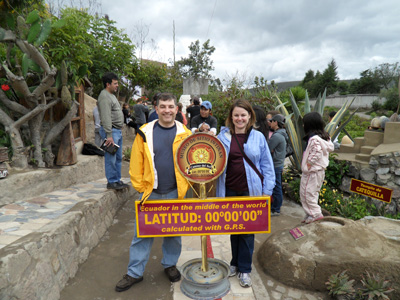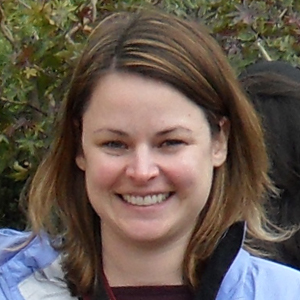Learning military lingo
Seven years ago, I took a giant leap from the comfort and routine of an academic environment at the Johns Hopkins University School of Medicine to the realm of military acquisition. My Ph.D. thesis work was in understanding the molecular mechanisms of how the simian version of HIV-AIDS affected the primate central nervous system. But it quickly became apparent that bench work was not for me.
 |
|
Emily Heuring left the bench for a career that would help policymakers understand scientific concepts. Her work at the Institute for Defense Analyses is usually an office job, but it has taken her to operational test events in the field. Above, adventure-seeking. Heuring is shown in Ecuador last year with her now-husband, Terry. |
As a person who likes instant gratification for hard work, I knew working for months on a single experiment just wasn’t my cup of tea. So I decided to take a nontraditional career path shortly after starting graduate school. I wanted to use my training in molecular biology and virology to help nonspecialists, particularly government policymakers, understand difficult scientific concepts. I looked for positions in the Washington, D.C., area. After replying to a job posting in the Washington Post, I got a call from the Institute for Defense Analyses in Alexandria, Va.
IDA is a nonprofit that provides the government, mainly the U.S. Department of Defense, with unbiased and not financially motivated technical analyses of a variety of subjects. To do this, IDA employs people from a wide range of backgrounds, including physical, life and computer scientists and former members of the military.
At IDA, I provide technical expertise for the evaluation of chemical and biological defense programs within the DOD. Over the years, I have analyzed data and written reports about a variety of chemical and biological defense systems, including detectors for biological agent aerosols and chemical vapors, polymerase chain-reaction machines for medical diagnostics, and systems mounted on armored vehicles.
For the most part, my job is a desk job, and I spend most of my time reading and writing reports, listening to teleconferences and attending meetings. However, one of the perks is attending operational test events in the field. These events are held at military test ranges all over the country and are intended to test systems in the most realistic environments possible. Because testing of chemical and biological defense systems with actual agents, such as nerve gas or anthrax, is restricted to laboratory environments, we evaluate the performance of detectors during operational test events using benign stimulants that present the detectors with as realistic a challenge as possible without harming the environment or the system operators.
During operational testing, military personnel operate the systems in the same way they would operate them in the field. By observing the operational test and evaluating the data from the test, I can discern whether these detection systems actually work the way they should and how easily military personnel can use them.
When I first came to IDA, I had no experience in the military. Just learning how the bureaucracy associated with a DOD-acquisition program worked, not to mention the volumes of acronyms associated with programs, took me several months. At the beginning, I sat through many meetings with no idea of what was being discussed because I wasn’t up to speed with DOD lingo. Another problem I had to overcome was being unfamiliar with the ranks and insignias of the various military officers and enlisted personnel. Nothing is more insulting to a colonel than being mistaken for a major! With time and patient mentoring from other IDA research staff members, I got comfortable with my role and responsibilities at IDA as well as military culture and language.
My work at IDA is extremely satisfying, because people with Ph.D.s in technical areas are held in special regard. If I offer an opinion or a point of view, people listen. While they may not always agree with what I have to say, they understand that I don’t have a dog in the fight and that I’m really just trying to help the program. My input also is valued highly by my DOD sponsor as well as my colleagues at IDA. I feel the work I do on a daily basis has an impact, most notably in ensuring that the soldiers, sailors, airmen and marines get systems that work reliably and provide them with accurate information.
My advice to any scientist seeking an alternative career is to not be afraid to do something outside of your comfort zone. Joining an organization that worked with the military was probably the last thing I thought I would end up doing when I started graduate school. However, looking back now after seven years, I’m happy to say that in making my giant leap from the bench to the world of military acquisition, I landed on my feet and am now marching along happily.
Enjoy reading ASBMB Today?
Become a member to receive the print edition four times a year and the digital edition monthly.
Learn moreFeatured jobs
from the ASBMB career center
Get the latest from ASBMB Today
Enter your email address, and we’ll send you a weekly email with recent articles, interviews and more.
Latest in Careers
Careers highlights or most popular articles

From humble beginnings to unlocking lysosomal secrets
Monther Abu–Remaileh will receive the ASBMB’s 2026 Walter A. Shaw Young Investigator Award in Lipid Research at the ASBMB Annual Meeting, March 7-10 in Washington, D.C.

Chemistry meets biology to thwart parasites
Margaret Phillips will receive the Alice and C. C. Wang Award in Molecular Parasitology at the ASBMB Annual Meeting, March 7-10 in Washington, D.C.

Decoding how bacteria flip host’s molecular switches
Kim Orth will receive the Earl and Thressa Stadtman Distinguished Scientists Award at the ASBMB Annual Meeting, March 7–10, just outside of Washington, D.C.

Defining JNKs: Targets for drug discovery
Roger Davis will receive the Bert and Natalie Vallee Award in Biomedical Science at the ASBMB Annual Meeting, March 7–10, just outside of Washington, D.C.

Upcoming opportunities
No matter where you are in your career and what future path you aspire to, everyone needs leadership skills. Join ASBMB for practical strategies for building and practicing leadership skills.

Close out ASBMB 2026 with a bang
The closing reception of the 2026 ASBMB Annual Meeting will be held at the Torpedo Factory Art Center in Alexandra, Virginia.

